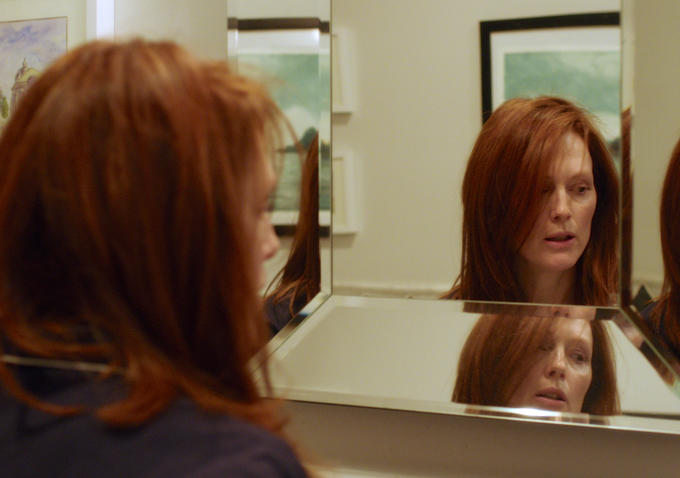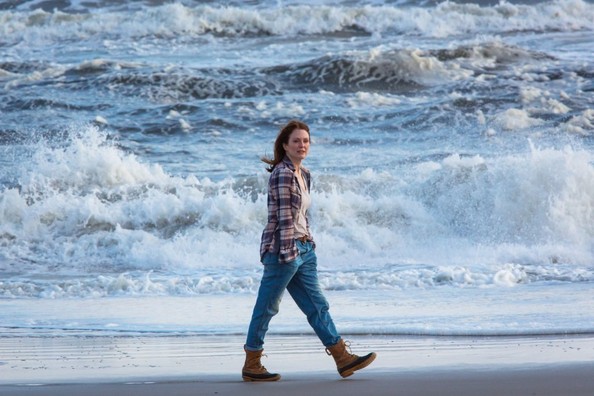Michael C. here to sort out a few mixed feelings at the prospect of the impending Julianne Moore juggernaut. Let me cut to right to the matter on everyone’s mind and say that any Academy voter who checks a box for Julianne Moore for Best Actress next year will have no reason to feel anything but pride in his or her choice. Her performance as Alice Howland, a 50-year-old linguistics professor suffering from early onset Alzheimer’s is every bit as good as billed. But let us also acknowledge the plain truth that Moore’s work here is all the more impressive because she is doing the heavy lifting for a script and direction that are not operating at anywhere near her level.
To point out that there is little exceptional or even all that much better than competent in Still Alice outside of Julianne Moore’s performance is to risk coming off like some sort of stone-hearted gargoyle. Who doesn’t feel the urge to pull some punches when presented with such an earnestly good intentioned film? And that is to say nothing of the reluctance to rain sour disapproval down on the Best Actress parade currently gaining steam on its march toward the Oscar podium. Who wants to spoil a perfectly good Julianne Moore coronation? Not this critic. [More...]

So I would love to give the film a polite nodding approval and carry on cheering until there is no longer a scrap of red carpet left anywhere that Moore hasn’t trod elegantly across, but writer/directors Richard Glatzer and Wash Westmoreland make it impossible to ignore the sizable gap between the emotional impact they are aiming for and what they actually achieve.
I won’t attempt to deny Still Alice is often moving (how could it not be?) but it never manages to create a sense of real, messy life existing outside the narrow focus of its scenes. Interactions between Alice and her family hit one note at a time, her husband (Alec Baldwin) is a workaholic, her daughter (Kristen Stewart) is resentful - much the same way the film dutifully checks of the steadily worstening symptoms of Alice's condition. With a film like Haneke’s Amour the uncluttered, austere approach felt like the end result of an effort to plumb the subject for every possible wrinkle of meaning. In Still Alice you get the impression that the focus on the disease’s effects is because the film isn’t up to the task of tackling any greater complexities. Moore’s character is a professor of linguistics so the film can have the easy irony of a woman whose life is devoted to the study of language failing to remember the simplest of words, as measured by Alice’s steadily decreasing scores in Words With Friends. Compare that to something like Margaret Edson’s Wit, which uses its cancer stricken Professor’s field of metaphysical poetry as a powerful lens through which to view the situation and the protagonist.
None of this is to say that Glatzer and Westmoreland have crafted a bad film exactly, just a hopelessly bland one. Their one move as visual stylists is to blur the focus in a few shots to show Alice’s confusion. The biggest compliment one can pay them is that they possess a delicacy that keeps the proceedings from descending into mawkishness and which rescues the film on those occasions when it skirts the edges of emotional manipulation, like the moment where when Alice drops her carefully prepared notes while struggling against the effects of her disease to deliver a speech.
But then I can’t talk about that scene, or any scene, without it all coming back to just how good Moore is in this film. The scene as written is a serviceable version of the one that pops up in a few films every Oscar season where the hero triumphs over adversity and receives a tearful standing ovation for their troubles. Yet in Moore’s hands it’s mesmerizing. Moore lets us see every nuance in Alice, her nervousness, the way she absorbs the implications of what she has written anew as she says it, the dulling effects of the disease clashing against the frustration of the brilliant woman who is used to being in control. It’s like that in every scene. To say that she elevates the material is understatement. Her performance is this movie.

In the likely event that Julianne Moore picks up an Oscar for this performance I will be unreserved in my joy at seeing one of our best actresses being rewarded for stellar work. Yet if Moore’s overdue status can play into the decision to award her, can it also be the source of the tiniest taboo reluctance to see her take the big trophy for this film? Moore has a long list of unforgettable characters to her credit, from Amber Waves to Maude Lebowski to Cathy Whitaker, and despite her unassailable efforts, Alice Howland is not on the same level. She’s not even the most memorable character I’ve seen Moore play this year. If she were to win Best Actress it will be well deserved, let no one argue otherwise, but I can’t silence the nagging disappointment that her belated win may not be for breathing life into a great character, but for elevating a thin one.
Grade C+
Related: Nathaniel's take | More Julianne Moore